deepfake
Latest

TikTok-owner ByteDance reportedly built a deepfake maker
TikTok parent company ByteDance has built a feature that could let users create their own deepfakes, TechCrunch reports. The feature, referred to as Face Swap, was spotted in code in both TikTok and the Chinese app Douyin. It asks users to scan their face and then transfers their image to videos.

Facebook helped Reuters create an online course on identifying deepfakes
Reuters has released a new 45-minute online course designed to help give journalists the tools they need to spot and avoid sharing manipulated pictures, videos and audio clips. While deepfakes are obviously a major component of the material, there's also advice on how to approach real media that's been co-opted so that it presents an entirely different story than it did originally. Even if you're not a journalist, you can check out the course for free.

Snapchat's Cameo test slips your face into GIFs
GIFs are great for conveying your reactions, but they're not usually very personal -- and recording yourself probably won't be that exciting. Snap might have found a way to bridge those two worlds. The company has confirmed to TechCrunch that it's testing a Cameo feature which inserts your face into a selection of (currently pre-made) GIFs. You just take a selfie, pick a generic body type and your face will animate as if it were you, including mouth movements. Think of it like a deepfake, but this time friendly instead of creepy.
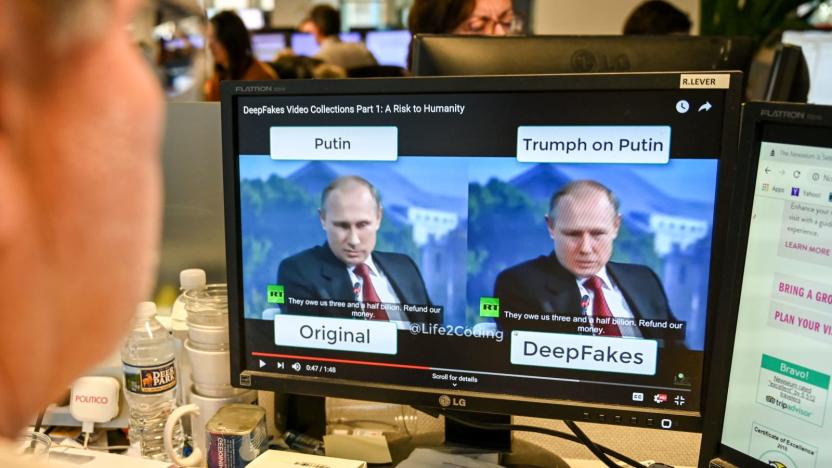
Twitter reveals how it plans to address deepfakes
Twitter said last month it was working on ways to better to handle deepfakes. It just released draft guidelines on how to address the problem and it's looking for the public to weigh in and help shape policies on what it describes as "synthetic and manipulated media."
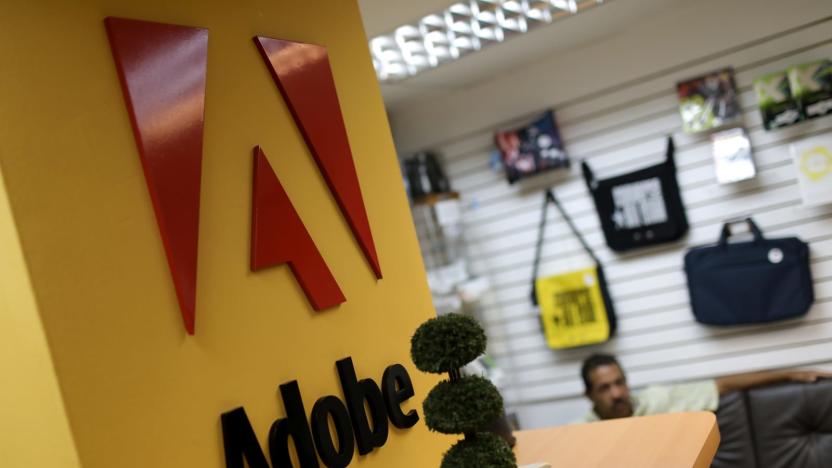
Adobe, Twitter and the New York Times team up to fight digital fakes
Adobe, Twitter and the New York Times are tired of seeing fake media propagate, and they're teaming up to do something about it. The trio has launched a Content Authenticity Initiative that aims to create a standard for digital media attribution. Ideally, you'd know whether or not a picture or video is legitimate simply by examining the file -- you'd know if it had been manipulated.

Facebook AI can 'hide' people from facial recognition
Facebook has already stopped using facial recognition by default, but now it might have a way for people to dodge facial recognition altogether. Its researchers have developed an AI system that can "de-identify" people in real time, including live videos. The approach pairs an adversarial auto-encoder with a trained face classifier to ever-so-slightly distort a person's face in a way that confuses facial recognition systems while preserving a natural look that stays recognizable by honest-to-goodness humans. You might see tiny differences in Jennifer Lawrence's face, for instance, but you won't have any doubt that it's her.
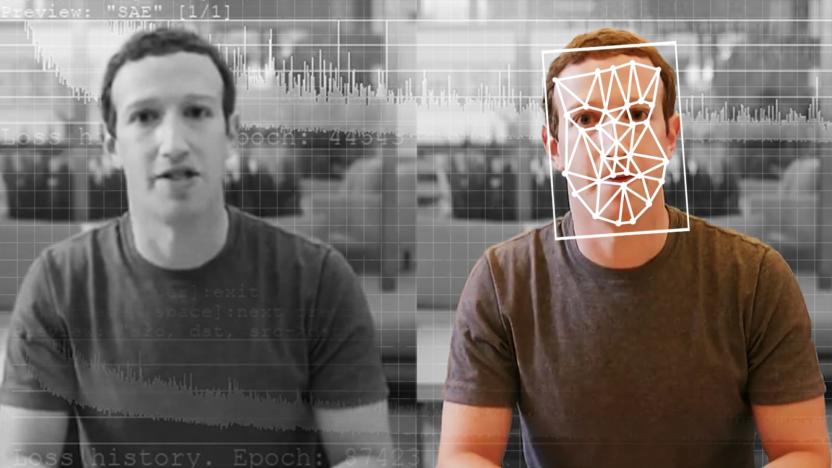
Amazon joins Facebook's fight against deepfakes
Facebook will have some extra help in its quest to fight deepfakes. Amazon Web Services is joining the Deepfake Detection Challenge as both a technical partner and as a member of the committee overseeing the challenge. It'll offer machine learning experts for "technical support and guidance," and will offer $1 million in AWS credits to teams that need cloud services to complete their detection work.
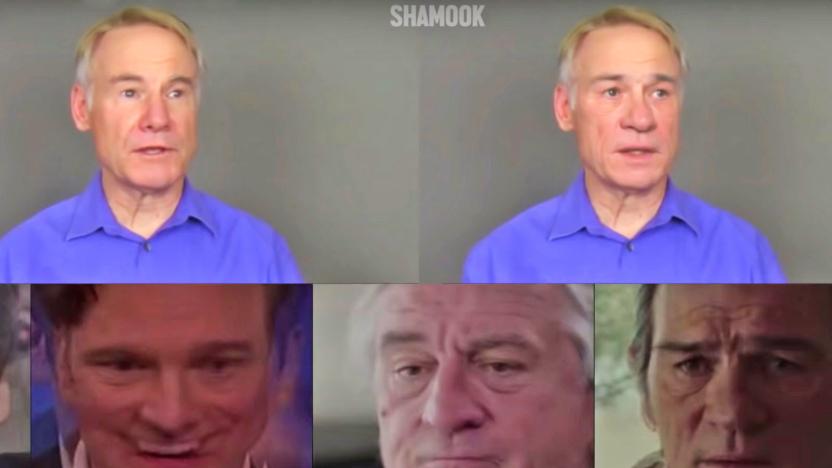
These deepfake celebrity impressions are equally amazing and alarming
Actor Jim Meskimen partnered with deepfake artist Sham00k to make his celebrity impressions a little more realistic. Meskimen and Sham00k shared the results in a YouTube video, and honestly, they're pretty remarkable. While Meskimen did the voices, deepfake software applied the facial features of 20 celebrities, including George Clooney, Nicholas Cage, Colin Firth, Robert De Niro, Nick Offerman, Arnold Schwartzenegger, Robin Williams and George W. Bush.
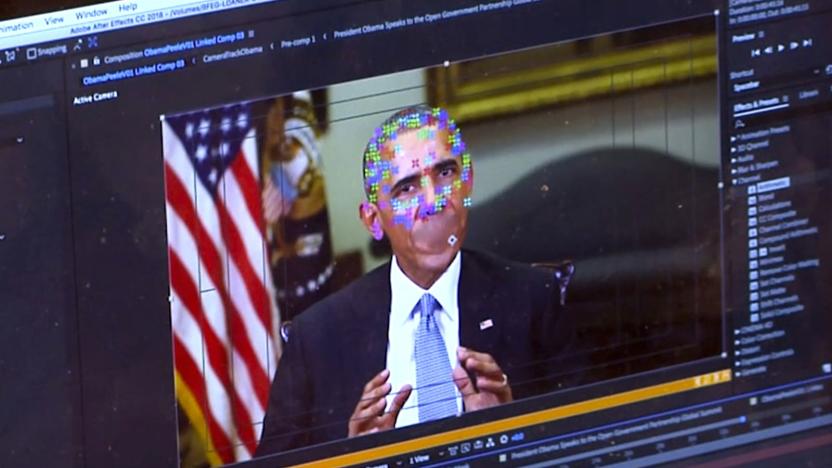
California cracks down on political and pornographic deepfakes
Deepfake videos can be fun, but not when it comes to politcs and pornography. Now, the state of California is doing something about it with two new bills signed into law last week by Governor Gavin Newsom. The first makes it illegal to post any manipulated videos that could, for instance, replace a candidate's face or speech in order to discredit them, within 60 days of an election. The other will allow residents of the state to sue anyone who puts their image into a pornographic video using deepfake technology.
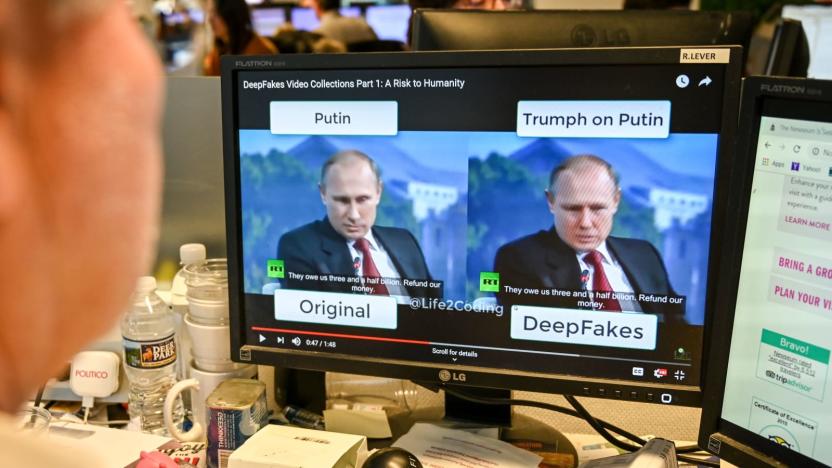
Google fights deepfakes by releasing 3,000 deepfakes
Google has released a pretty huge dataset of deepfake videos in an effort to support researchers working on detection tools. Deepfake videos look and sound so authentic, they could be used for highly convincing disinformation campaigns in the upcoming elections. They could also cause countless issues for individuals like celebrities whose faces can be used to create fake pornographic videos that look authentic.
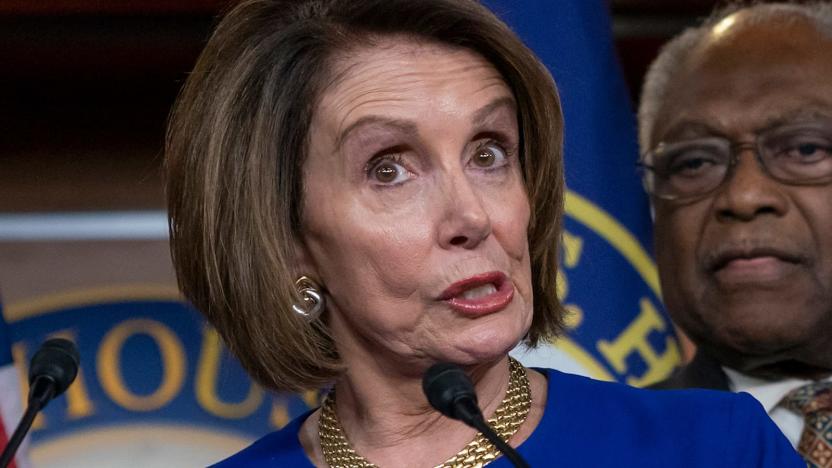
Facebook teams up with Microsoft and MIT to fight deepfakes
With deepfakes expected to pose a major challenge in the upcoming 2020 election and beyond, Facebook detailed one way in which it plans to take on the problem. As part of a new partnership that involves, among others, Microsoft, MIT and the University of Oxford, Facebook plans to invest more than $10 million to take part in an industry-wide effort to fight deepfakes. The initiative is called the Deepfake Detection Challenge (DFDC). It aims to create open source tools that companies, governments and media organizations can use to better detect when a video has been doctored. Facebook's contribution to the project includes hiring actors to create videos researchers can use to test the detection tools they create.
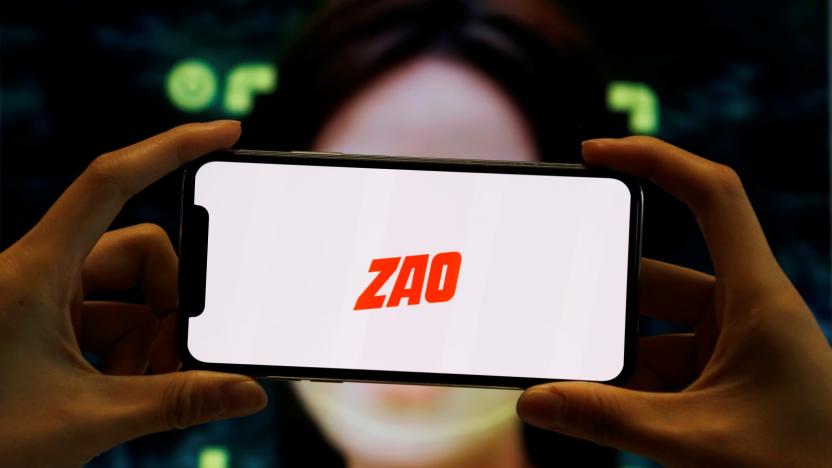
Popular face-swapping app Zao sparks another privacy outcry
Yet another AI-powered face-swapping app has gone viral, and it's introducing the usual privacy concerns in record time. The iOS app Zao quickly topped China's edition of the App Store since its August 30th launch thanks to its uncanny ability to put your face into scenes from movies and TV shows. However, Bloomberg noted that an early version of Zao's user agreement gave the developer Changsha Shenduronghe Network Technology (a subsidiary of dating and livestreaming company Momo) "free, irrevocable, permanent, transferable and relicense-able" rights to all user-made content. In other words, photos and videos involving your face effectively became the app creator's property.
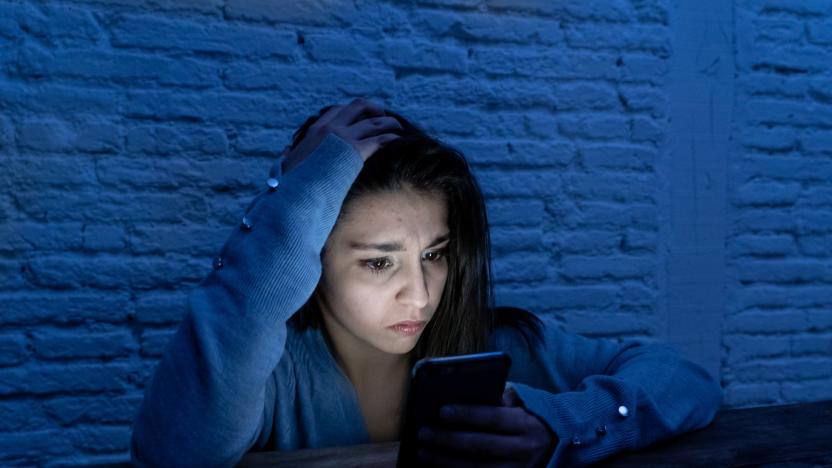
Virginia updates its revenge porn law to include deepfakes
With AI tools making it increasingly easy to create fake explicit images, the problem of revenge porn is only getting worse. Now, the state of Virginia has expanded its law against harassment through the sharing of sexual images to cover deepfake images and videos.

Recommended Reading: Algorithms and school surveillance
Aggression Detectors: The unproven, invasive surveillance technology schools are using to monitor students Jack Gillum and Jeff Kao, ProPublica Following the rise in mass shootings, schools, hospitals and other public places are installing tech to monitor people. Part of this effort includes using algorithm-equipped microphones to capture audio, with the goal of detecting stress or anger before bad things happen. The problem? They aren't reliable and their mere existence is a massive invasion of privacy.
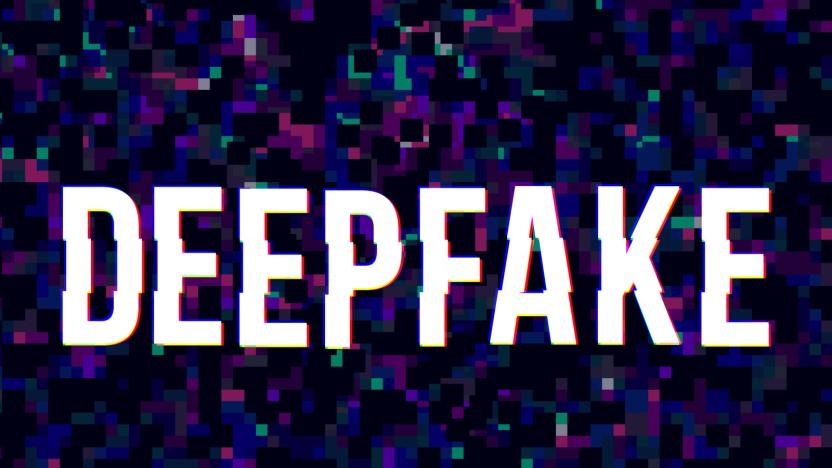
A new tool detects deepfakes with 96 percent accuracy
A new tool developed by researchers from the USC Information Sciences Institute (USC ISI) may prove to be a major help in the ongoing war against deepfakes. The tool focuses on subtle face and head movements as well as artifacts in files to determine if a video has been faked, and can allegedly identify the computer-generated videos with up to 96 percent accuracy, according to a paper published by the Computer Vision Foundation.

Recommended Reading: Fighting deepfakes
Top AI researchers race to detect 'deepfake' videos: 'We are outgunned' Drew Harwell, The Washington Post The 2016 US presidential election was plagued by fake news and election meddling across the internet. With the rise of so-called deepfake technology, fact-checkers and arbiters of truth face a new challenge. And as The Washington Post reports, researchers aren't ready to separate the real from the fabricated in 2020.
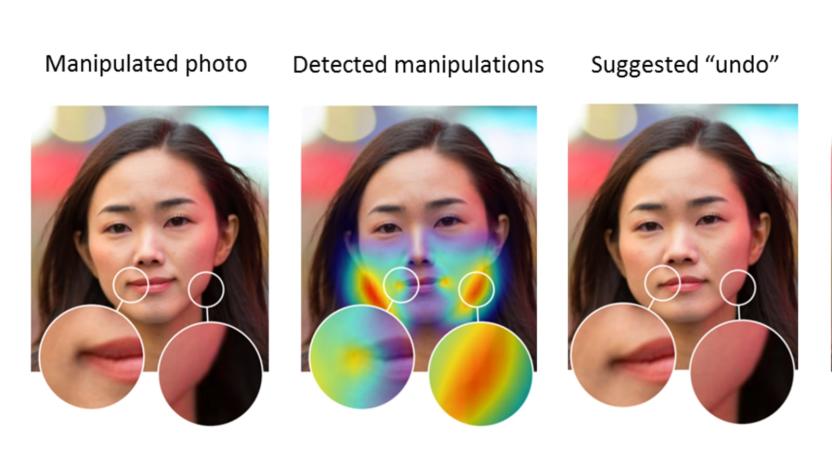
Adobe trained AI to detect facial manipulation in Photoshop
A team of Adobe and UC Berkeley researchers trained AI to detect facial manipulation in images edited with Adobe Photoshop. The researchers hope the tool will help restore trust in digital media at a time when deepfakes and fake faces are more common and more deceptive. It could also democratize image forensics, making it possible for more people to uncover image manipulation.
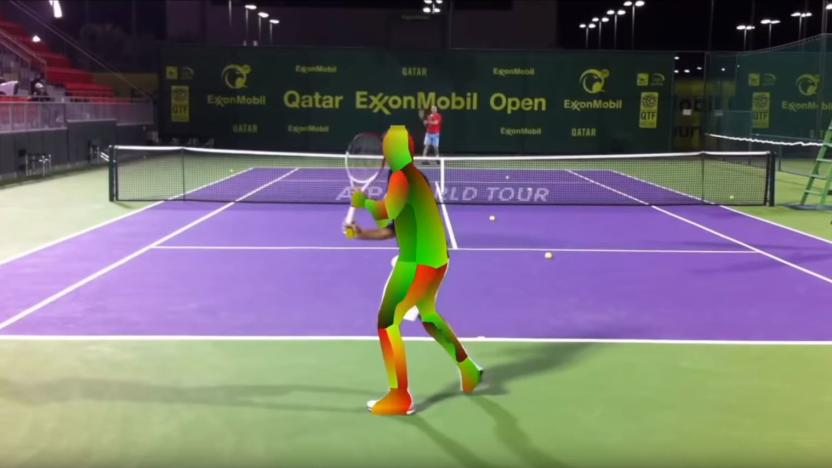
Facebook AI turns real people into controllable game characters
Facebook's AI Research team has created an AI called Vid2Play that can extract playable characters from videos of real people, creating a much higher-tech version of '80s full-motion video (FMV) games like Night Trap. The neural networks can analyze random videos of people doing specific actions, then recreate that character and action in any environment and allow you to control them with a joystick.

Scarlett Johansson says fighting deepfake porn is 'fruitless'
Scarlett Johansson knows better than most how horrible a place the internet can be. She's been the victim of leaks before where private photos have ended up publicly available. And now she's been targeted by a new kind of harasser, ones that use artificial intelligence to create surprisingly convincing (but fake) pornographic videos of her. One such video has racked up over 1.5 million views, and she's come to the sad conclusion that trying to fight these "deepfake" videos is "fruitless" and a "lost cause."

US lawmakers are concerned about deepfake technology
Three US Representatives have sent a letter to the Director of National Intelligence asking for a report on deepfake technology, how it could be used to harm the US and any countermeasures that can be taken to detect and deter nefarious use of the technology. While deepfakes gained notoriety when Reddit users began swapping celebrity faces onto porn stars, the potential for the technology's use in misinformation campaigns has generated a fair amount of concern. "Forged videos, images or audio could be used to target individuals for blackmail or for other nefarious purposes," the lawmakers said in their letter.










